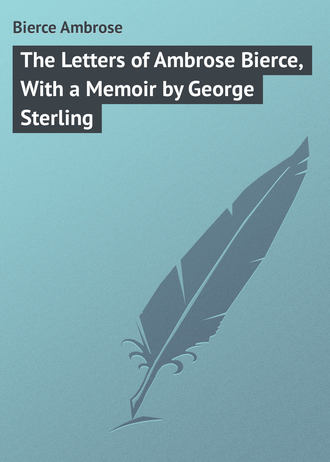 полная версия
полная версияThe Letters of Ambrose Bierce, With a Memoir by George Sterling
Of course you are right about the magazine editors not knowing poetry when they see it. But who does? I have not known more than a half-dozen persons in America that did, and none of them edited a magazine.
* * *No, I did not write the "Urus-Agricola-Acetes stuff," though it was written for me and, I believe, at my suggestion. The author was "Jimmy" Bowman, of whose death I wrote a sonnet which is in Black Beetles. He and I used to have a lot of fun devising literary mischiefs, fighting sham battles with each other and so forth. He was a clever chap and a good judge of whiskey.
Yes, in The Cynic's Dictionary I did "jump from A to M." I had previously done the stuff in various papers as far as M, then lost the beginning. So in resuming I re-did that part (quite differently, of course) in order to have the thing complete if I should want to make a book of it. I guess the Examiner isn't running much of it, nor much of anything of mine.
* * *I like your love of Keats and the early Coleridge.
Sincerely yours, Ambrose Bierce.The N. Y.American Office,Washington, D. C.,October 12,1904.
My dear Davis,
The "bad eminence" of turning down Sterling's great poem is one that you will have to share with some of your esteemed fellow magazinists – for examples, the editors of the Atlantic, Harper's, Scribner's, The Century, and now the Metropolitan, all of the élite. All of these gentlemen, I believe, profess, as you do not, to know literature when they see it, and to deal in it.
Well I profess to deal in it in a small way, and if Sterling will let me I propose some day to ask judgment between them and me.
Even you ask for literature – if my stories are literature, as you are good enough to imply. (By the way, all the leading publishers of the country turned down that book until they saw it published without them by a merchant in San Francisco and another sort of publishers in London, Leipzig and Paris.) Well, you wouldn't do a thing to one of my stories!
No, thank you; if I have to write rot, I prefer to do it for the newspapers, which make no false pretences and are frankly rotten, and in which the badness of a bad thing escapes detection or is forgotten as soon as it is cold.
I know how to write a story (of the "happy ending" sort) for magazine readers for whom literature is too good, but I will not do so so long as stealing is more honorable and interesting.
I've offered you the best stuff to be had – Sterling's poem – and the best that I am able to make; and now you must excuse me. I do not doubt that you really think that you would take "the kind of fiction that made 'Soldiers and Civilians' the most readable book of its kind in this country," and it is nice of you to put it that way; but neither do I doubt that you would find the story sent a different kind of fiction and, like the satire which you return to me, "out of the question." An editor who has a preformed opinion of the kind of stuff that he is going to get will always be disappointed with the stuff that he does get.
I know this from my early experience as an editor – before I learned that what I needed was, not any particular kind of stuff, but just the stuff of a particular kind of writer.
All this without any feeling, and only by way of explaining why I must ask you to excuse me.
Sincerely yours, Ambrose Bierce.Washington, D. C.,December 6,1904.
Dear George,
* * *Yes, I got and read that fool thing in the August Critic. I found in it nothing worse than stupidity – no malice. Doubtless you have not sounded the deeper deeps of stupidity in critics, and so are driven to other motives to explain their unearthly errors. I know from my own experience of long ago how hard it is to accept abominable criticism, obviously (to the criticee) unfair, without attributing a personal mean motive; but the attribution is nearly always erroneous, even in the case of a writer with so many personal enemies as I. You will do well to avoid that weakness of the tyro. * * * has the infirmity in an apparently chronic form. Poets, by reason of the sensibilities that make them poets, are peculiarly liable to it. I can't see any evidence that the poor devil of the Critic knew better.
The Wine of Wizardry is at present at the Booklovers'. It should have come back ere this, but don't you draw any happy augury from that: I'm sure they'll turn it down, and am damning them in advance.
I had a postal from * * * a few days ago. He was in Paris. I've written him only once, explaining by drawing his attention to the fact that one's reluctance to write a letter increases in the ratio of the square of the distance it has to go. I don't know why that is so, but it is – at least in my case.
* * *Yes, I'm in perfect health, barring a bit of insomnia at times, and enjoy life as much as I ever did – except when in love and the love prospering; that is to say, when it was new.
Sincerely yours, Ambrose Bierce.Washington, D. C.,December 8,1904.
Dear George,
This is the worst yet! This jobbernowl seems to think "The Wine of Wizardry" a story. It should "arrive" and be "dramatic" – the denouement being, I suppose, a particularly exciting example of the "happy ending."
My dear fellow, I'm positively ashamed to throw your pearls before any more of these swine, and I humbly ask your pardon for having done it at all. I guess the "Wine" will have to await the publication of your next book.
But I'd like to keep this fellow's note if you will kindly let me have it. Sometime, when the poem is published, I shall paste it into a little scrap book, with all the notes of rejection, and then if I know a man or two capable of appreciating the humor of the thing I can make merry over it with them.
Sincerely yours, Ambrose Bierce.The Army andNavy Club,Washington, D. C.,My permanentaddress,February 18,1905.
Dear George,
It's a long time since the date of your latest letter, but I've been doing two men's work for many weeks and have actually not found the leisure to write to my friends. As it is the first time that I've worked really hard for several years I ought not to complain, and don't. But I hope it will end with this session of Congress.
I think I did not thank you for the additional copies of your new book – the new edition. I wish it contained the new poem, "A Wine of Wizardry." I've given up trying to get it into anything. I related my failure to Mackay, of "Success," and he asked to be permitted to see it. "No," I replied, "you too would probably turn it down, and I will take no chances of losing the respect that I have for you." And I'd not show it to him. He declared his intention of getting it, though – which was just what I wanted him to do. But I dare say he didn't.
Yes, you sent me "The Sea Wolf." My opinion of it? Certainly – or a part of it. It is a most disagreeable book, as a whole. London has a pretty bad style and no sense of proportion. The story is a perfect welter of disagreeable incidents. Two or three (of the kind) would have sufficed to show the character of the man Larsen; and his own self-revealings by word of mouth would have "done the rest." Many of these incidents, too, are impossible – such as that of a man mounting a ladder with a dozen other men – more or less – hanging to his leg, and the hero's work of rerigging a wreck and getting it off a beach where it had stuck for weeks, and so forth. The "love" element, with its absurd suppressions and impossible proprieties, is awful. I confess to an overwhelming contempt for both the sexless lovers.
Now as to the merits. It is a rattling good story in one way; something is "going on" all the time – not always what one would wish, but something. One does not go to sleep over the book. But the great thing – and it is among the greatest of things – is that tremendous creation, Wolf Larsen. If that is not a permanent addition to literature, it is at least a permanent figure in the memory of the reader. You "can't lose" Wolf Larsen. He will be with you to the end. So it does not really matter how London has hammered him into you. You may quarrel with the methods, but the result is almost incomparable. The hewing out and setting up of such a figure is enough for a man to do in one life-time. I have hardly words to impart my good judgment of that work.
* * *That is a pretty picture of Phyllis as Cleopatra – whom I think you used to call "the angel child" – as the Furies were called Eumenides.
* * *I'm enclosing a review of your book in the St. Louis "Mirror," a paper always kindly disposed toward our little group of gifted obscurians. I thought you might not have seen it; and it is worth seeing. Percival Pollard sends it me; and to him we owe our recognition by the "Mirror."
I hope you prosper apace. I mean mentally and spiritually; all other prosperity is trash.
Sincerely yours, Ambrose Bierce.Washington, D. C.,April 17,1905.
Dear George,
I've reached your letter on my file. I wonder that I did, for truly I'm doing a lot of work – mostly of the pot-boiler, newspaper sort, some compiling of future – probably very future – books and a little for posterity.
Valentine has not returned the "Wine of Wizardry," but I shall tell him to in a few days and will then try it on the magazines you mention. If that fails I can see no objection to offering it to the English periodicals.
I don't know about Mackay. He has a trifle of mine which he was going to run months ago. He didn't and I asked it back. He returned it and begged that it go back to him for immediate publication. It went back, but publication did not ensue. In many other ways he has been exceedingly kind. Guess he can't always have his way.
* * *I read that other book to the bitter end – the "Arthur Sterling" thing. He is the most disagreeable character in fiction, though Marie Bashkirtseff and Mary McLean in real life could give him cards and spades. Fancy a poet, or any kind of writer, whom it hurts to think! What the devil are his agonies all about – his writhings and twistings and foaming at all his mouths? What would a poem by an intellectual epileptic like that be? Happily the author spares us quotation. I suppose there are Arthur Sterlings among the little fellows, but if genius is not serenity, fortitude and reasonableness I don't know what it is. One cannot even imagine Shakespeare or Goethe bleeding over his work and howling when "in the fell clutch of circumstance." The great ones are figured in my mind as ever smiling – a little sadly at times, perhaps, but always with conscious inaccessibility to the pinpricking little Titans that would storm their Olympus armed with ineffectual disasters and pop-gun misfortunes. Fancy a fellow wanting, like Arthur Sterling, to be supported by his fellows in order that he may write what they don't want to read! Even Jack London would gag at such Socialism as that.
* * *I'm going to pass a summer month or two with the Pollards, at Saybrook, Conn. How I wish you could be of the party. But I suppose you'll be chicken-ranching then, and happy enough where you are. I wish you joy of the venture and, although I fear it means a meagre living, it will probably be more satisfactory than doubling over a desk in your uncle's office. The very name Carmel Bay is enchanting. I've a notion I shall see that ranch some day. I don't quite recognize the "filtered-through-the-emasculated-minds-of-about-six-fools" article from which you say I quote – don't remember it, nor remember quoting from it.
I don't wonder at your surprise at my high estimate of Longfellow in a certain article. It is higher than my permanent one. I was thinking (while writing for a newspaper, recollect) rather of his fame than of his genius – I had to have a literary equivalent to Washington or Lincoln. Still, we must not forget that Longfellow wrote "Chrysaor" and, in narrative poetry (which you don't care for) "Robert of Sicily." Must one be judged by his average, or may he be judged, on occasion, by his highest? He is strongest who can lift the greatest weight, not he who habitually lifts lesser ones.
As to your queries. So far as I know, Realf did write his great sonnets on the night of his death. Anyhow, they were found with the body. Your recollection that I said they were written before he came to the Coast is faulty. Some of his other things were in print when he submitted them to me (and took pay for them) as new; but not the "De Mortuis."
I got the lines about the echoes (I think they go this way:
"the loonLaughed, and the echoes, huddling in affright,Like Odin's hounds went baying down the night")from a poem entitled, I think, "The Washers of the Shroud." I found it in the "Atlantic," in the summer of 1864, while at home from the war suffering from a wound, and – disgraceful fact! – have never seen nor heard of it since. If the magazine was a current number, as I suppose, it should be easy to find the poem. If you look it up tell me about it. I don't even know the author – had once a vague impression that it was Lowell but don't know.
The compound "mulolatry," which I made in "Ashes of the Beacon," would not, of course, be allowable in composition altogether serious. I used it because I could not at the moment think of the right word, "gyneolatry," or "gynecolatry," according as you make use of the nominative or the accusative. I once made "caniolatry" for a similar reason – just laziness. It's not nice to do things o' that kind, even in newspapers.
* * *I had intended to write you something of "beesness," but time is up and it must wait. This letter is insupportably long already.
My love to Carrie and Katie. Sincerely yours, Ambrose Bierce.
Army and Navy Club,Washington, D. C.,May 16,1905.
Dear George,
Bailey Millard is editor of "The Cosmopolitan Magazine," which Mr. Hearst has bought. I met him in New York two weeks ago. He had just arrived and learning from Hearst that I was in town looked me up. I had just recommended him to Hearst as editor. He had intended him for associate editor. I think that will give you a chance, such as it is. Millard dined with me and I told him the adventures of "A Wine of Wizardry." I shall send it to him as soon as he has warmed his seat, unless you would prefer to send it yourself. He already knows my whole good opinion of it, and he shares my good opinion of you.
I suppose you are at your new ranch, but I shall address this letter as usual.
* * *If you hear of my drowning know that it is the natural (and desirable) result of the canoe habit. I've a dandy canoe and am tempting fate and alarming my friends by frequenting, not the margin of the upper river, but the broad reaches below town, where the wind has miles and miles of sweep and kicks up a most exhilarating combobbery. If I escape I'm going to send my boat up to Saybrook, Connecticut, and navigate Long Island Sound.
Are you near enough to the sea to do a bit of boating now and then? When I visit you I shall want to bring my canoe.
I've nearly given up my newspaper work, but shall do something each month for the Magazine. Have not done much yet – have not been in the mind. Death has been striking pretty close to me again, and you know how that upsets a fellow.
Sincerely yours, Ambrose Bierce.Washington,June 16,1905.
Dear George,
I'm your debtor for two good long letters. You err in thinking your letters, of whatever length and frequency, can be otherwise than delightful to me.
No, you had not before sent me Upton Sinclair's article explaining why American literature is "bourgeois." It is amusingly grotesque. The political and economical situation has about as much to do with it as have the direction of our rivers and the prevailing color of our hair. But it is of the nature of the faddist (and of all faddists the ultra socialist is the most untamed by sense) to see in everything his hobby, with its name writ large. He is the humorist of observers. When Sinclair transiently forgets his gospel of the impossible he can see well enough.
I note what you say of * * * and know that he did not use to like me, though I doubt if he ever had any antipathy to you. Six or eight years ago I tackled him on a particularly mean fling that he had made at me while I was absent from California. (I think I had not met him before.) I told him, rather coarsely, what I thought of the matter. He candidly confessed himself in the wrong, expressed regret and has ever since, so far as I know, been just and even generous to me. I think him sincere now, and enclose a letter which seems to show it. You may return it if you will – I send it mainly because it concerns your poem. The trouble – our trouble – with * * * is that he has voluntarily entered into slavery to the traditions and theories of the magazine trade, which, like those of all trades, are the product of small men. The big man makes his success by ignoring them. Your estimate of * * * I'm not disposed to quarrel with, but do think him pretty square.
* * *Bless you, don't take the trouble to go through the Iliad and Odyssey to pick out the poetical parts. I grant you they are brief and infrequent – I mean in the translation. I hold, with Poe, that there are no long poems – only bursts of poetry in long spinnings of metrical prose. But even the "recitativo" of the translated Grecian poets has a charm to one that it may not have to another. I doubt if anyone who has always loved "the glory that was Greece" – who has been always in love with its jocund deities, and so forth, can say accurately just how much of his joy in Homer (for example) is due to love of poetry, and how much to a renewal of mental youth and young illusions. Some part of the delight that we get from verse defies analysis and classification. Only a man without a memory (and memories) could say just what pleased him in poetry and be sure that it was the poetry only. For example, I never read the opening lines of the Pope Iliad – and I don't need the book for much of the first few hundred, I guess – without seeming to be on a sunny green hill on a cold windy day, with the bluest of skies above me and billows of pasture below, running to a clean-cut horizon. There's nothing in the text warranting that illusion, which is nevertheless to me a part of the Iliad; a most charming part, too. It all comes of my having first read the thing under such conditions at the age of about ten. I remember that; but how many times I must be powerfully affected by the poets without remembering why. If a fellow could cut out all that extrinsic interest he would be a fool to do so. But he would be a better critic.
You ought to be happy in the contemplation of a natural, wholesome life at Carmel Bay – the "prospect pleases," surely. But I fear, I fear. Maybe you can get a newspaper connection that will bring you in a small income without compelling you to do violence to your literary conscience. I doubt if you can get your living out of the ground. But I shall watch the experiment with sympathetic interest, for it "appeals" to me. I'm a trifle jaded with age and the urban life, and maybe if you can succeed in that other sort of thing I could.
* * *As to * * * the Superb. Isn't Sag Harbor somewhere near Saybrook, Connecticut, at the mouth of the river of that name? I'm going there for a month with Percival Pollard. Shall leave here about the first of July. If Sag Harbor is easily accessible from there, and * * * would care to see me, I'll go and call on her. * * * But maybe I'd fall in love with her and, being now (alas) eligible, just marry her alive! – or be turned down by her, to the unspeakable wrecking of my peace! I'm only a youth – 63 on the 24th of this month – and it would be too bad if I got started wrong in life. But really I don't know about the good taste of being jocular about * * *. I'm sure she must be a serious enough maiden, with the sun of a declining race yellow on her hair. Eva Crawford thinks her most lovable – and Eva has a clear, considering eye upon you all.
* * *I'm going to send up my canoe to Saybrook and challenge the rollers of the Sound. Don't you fear – I'm an expert canoeist from boyhood. * * *
Sincerely, Ambrose Bierce.Washington, D. C.,December 3,1905.
Dear George,
I have at last the letter that I was waiting for – didn't answer the other, for one of mine was on the way to you.
* * *You need not worry yourself about your part of the business. You have acted "mighty white," as was to have been expected of you; and, caring little for any other feature of the matter, I'm grateful to you for giving my pessimism and growing disbelief in human disinterestedness a sound wholesome thwack on the mazzard.
* * *Yes, I was sorry to whack London, for whom, in his character as author, I have a high admiration, and in that of publicist and reformer a deep contempt. Even if he had been a personal friend, I should have whacked him, and doubtless much harder. I'm not one of those who give their friends carte blanche to sin. If my friend dishonors himself he dishonors me; if he makes a fool of himself he makes a fool of me – which another cannot do.
* * *Your description of your new environment, in your other letter, makes me "homesick" to see it. I cordially congratulate you and Mrs. Sterling on having the sense to do what I have always been too indolent to do – namely as you please. Guess I've been always too busy "warming both hands before the fire of life." And now, when
"It sinks and I am ready to depart,"I find that the damned fire was in me and ought to have been quenched with a dash of cold sense. I'm having my canoe decked and yawl-rigged for deep water and live in the hope of being drowned according to the dictates of my conscience.
By way of proving my power of self-restraint I'm going to stop this screed with a whole page unused.
Sincerely yours, as ever, Ambrose Bierce.Washington, D. C.,February 3,1906.
Dear George,
I don't know why I've not written to you – that is, I don't know why God made me what I have the misfortune to be: a sufferer from procrastination.
* * *I have read Mary Austin's book with unexpected interest. It is pleasing exceedingly. You may not know that I'm familiar with the kind of country she writes of, and reading the book was like traversing it again. But the best of her is her style. That is delicious. It has a slight "tang" of archaism – just enough to suggest "lucent sirups tinct with cinnamon," or the "spice and balm" of Miller's sea-winds. And what a knack at observation she has! Nothing escapes her eye. Tell me about her. What else has she written? What is she going to write? If she is still young she will do great work; if not – well, she has done it in that book. But she'll have to hammer and hammer again and again before the world will hear and heed.
As to me I'm pot-boiling. My stuff in the N. Y. American (I presume that the part of it that you see is in the Examiner) is mere piffle, written without effort, purpose or care. My department in the Cosmopolitan is a failure, as I told Millard it would be. It is impossible to write topical stuff for a magazine. How can one discuss with heart or inspiration a thing that happens two months or so before one's comments on it will be read? The venture and the title were Hearst's notion, but the title so handicaps me that I can do nothing right. I shall drop it.
I've done three little stories for the March number (they may be postponed) that are ghastly enough to make a pig squeal.
* * *Sincerely yours, Ambrose Bierce.Washington, D. C.,March 12,1906.
My dear George,
First, about the "Wine," I dislike the "privately printed" racket. Can you let the matter wait a little longer? Neale has the poem, and Neale is just now inaccessible to letters, somewhere in the South in the interest of his magazine-that-is-to-be. I called when in New York, but he had flown and I've been unable to reach him; but he is due here on the 23rd. Then if his mag is going to hold fire, or if he doesn't want the poem for it, let Robertson or Josephare have a hack at it.
Barr is amusing. I don't care to have a copy of his remarks.
About the pirating of my stories. That is a matter for Chatto and Windus, who bought the English copyright of the book from which that one story came. I dare say, though, the publication was done by arrangement with them. Anyhow my interests are not involved.
I was greatly interested in your account of Mrs. Austin. She's a clever woman and should write a good novel – if there is such a thing as a good novel. I won't read novels.









